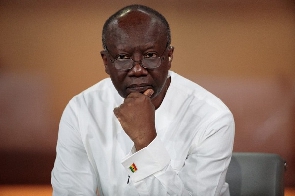- Home - News
- TWI News | TV
- Polls
- Year In Review
- News Archive
- Crime & Punishment
- Politics
- Regional
- Editorial
- Health
- Ghanaians Abroad
- Tabloid
- Africa
- Religion
- Election 2020
- Coronavirus
- News Videos | TV
- Photo Archives
- News Headlines
- Press Release
Business News of Monday, 18 May 2020
Source: goldstreetbusiness.com
Ghana’s debt stock hits GH¢236.1 billion first quarter of 2020 - BoG
Ghana’s total debt reached GHc236.1 billion by the end of March this year, according to the latest Summary of Economic and Financial data released by the Bank of Ghana last week after its Monetary Policy Committee met to review developments in the economy over the past two months.
According to the data, the GHc236.1 billion debt now sends Ghana’s Debt-to-GDP-Ratio to 59.3 percent. Out of the total debt stock, US$22.9 billion is external debt, which translates into 31.4 percent of GDP while GHc111.3 billion is domestic, cedi denominated debt, equivalent to 28 percent of the total value of the economy.
Also, out of the total debt stock, GHc1.8 billion remains outstandingm on the financial sector clean up.
Based on the summary of the financial and economic data, Ghana’s total debt stock has gone up by GHc18 billion since December 2019. However, tracking the debt position from March 2019 to March 2020, the total debt stock has gone up by GHc38.1 billion.
The increase in the debt stock from December 2019 to March 2020 can be attributed to the cedi’s marginal depreciation and recent funds advanced towards the cleanup of the banking and non-banking sectors of the economy.
The impact of the rising debt would be most strongly felt on Ghana’s debt servicing bill. According to the 2020 Budget government was planning to set aside GHc21.7 billion just to pay interest on the public debt.
The data further shows that total earnings from exports during the first quarter of this year stood at $3.9 billion, compared with a little over US$4 billion realized in the corresponding period of last year.
Gold for the first three months of this year brought in US$1.4 billion compared to a similar amount for the same period for last year. Cocoa generated US$956 million for the first quarter of 2020, compared to the US$832 million secured in the first quarter of 2019.
Earnings from oil were US$874.1 million for the first quarter of 2020 compared to a little over US$1 billion in 2019. On the other hand, total imports for the first quarter fell to US$2.9 billion, compared to US$3.3 billion for the same period in 2019.
Total non-oil imports stood at US$2.4 billion for the first quarter of 2020 compared to US$2.6 billion secured in the same period for 2019. This resulted in a trade surplus of US$934 million, (representing 1.4 percent of GDP) compared to US$642 million for the same period for 2019.
The country’s Gross International Reserves, as at the end of March this year stood at $10.2 billion which is a record high. This translates into 4.8 months of import cover, well above the 3.5 months target.
Ghana’s reserves were given major boost in February with the successful issuance of US$3 billion in Eurobonds. The strong international reserves position should provide local foreign exchange markets with confidence enough to discourage speculative reading positions against the cedi, which in turn should provide the domestic currency with stability while the national economy strives to fend off the debilitating adverse effects of the coronavirus outbreak.











